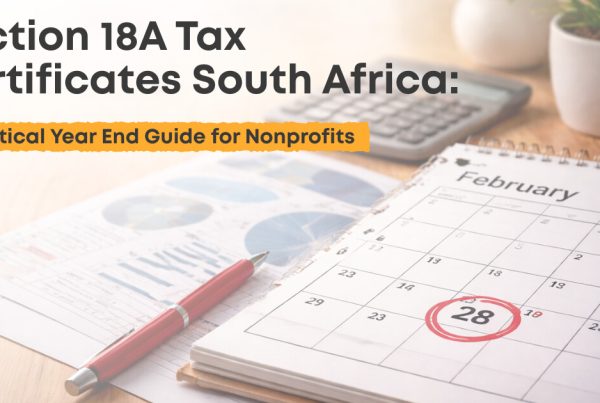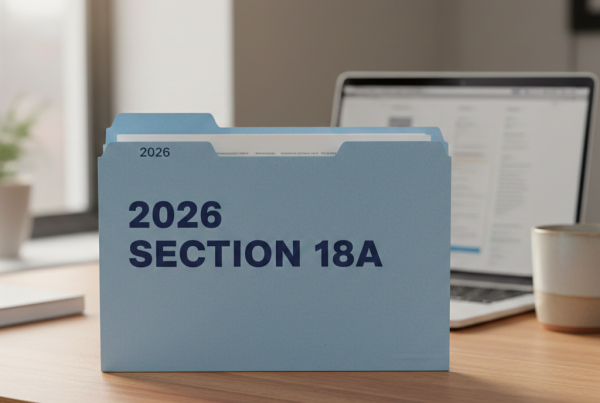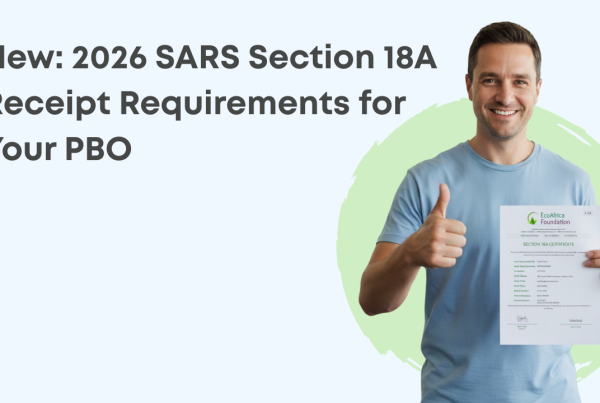Section 18A Tax Certificates – A Win-Win for Donors & PBOs
Section 18A Tax Certificates can be issued for donations made to SARS approved Public Benefit Organisations (PBOs) that undertake or fund qualifying 18A activities. Not all PBOs can issue 18A certificates, the PBO letter must be authorized to issue Section 18A Tax Certificates. The section 18A Tax Certificates are used by donors to claim a tax deduction on their donations made to the 18A-PBO.
What types of donations qualify for a Section 18A Tax Certificate?
There are a few different types of donations that can qualify for a Section 18A certificate in South Africa. These include cash (monetary) as well as goods in kind donations to 18A-PBOs. In order to qualify, the donation must be made on or before the end of the financial year (28 February) and it must only be used to undertake or fund qualifying 18A activities.
Compliant Section 18A Certificate required to claim a tax deduction
Donors can claim their income tax deductions on their donations only if they have been issued with valid Section 18A Certificate by an approved 18A- PBO. The certificate must include the following information:
- Name and contact information of the 18A-PBO
- Name and contact information of the donor
- For cash donations – the amount received
- For non-monetary donations – the nature and value of the donation
- The date on which the donation was received
- A statement that the donation will be used exclusively for 18A public benefit activities
Read more on the importance of being compliant here: ” The Importance of SARS compliance for NPOs and PBOs. “
How Donors benefit from Section 18A Tax Certificates
Reduced Tax Liability:
Section 18A Tax Certificates provide donors with a means of reducing their taxable income, as the certificates can be used to reduce their tax liability. This provides donors with an incentive to donate to causes that they support, as they can receive a tax benefit while also contributing to a good cause.
The 18A deduction is limited to 10% of the Donor’s taxable income for that year. Any excess amount donated can be carried forward to the following year to reduce the donor’s tax liability in that year.
Example
A company with a taxable income of R 500 000 would pay R 140 000 (28%) in income tax.
The company now donates R 50 000 to an 18A PBO.
This R 50 000 donation reduces the company’s taxable income to R 450 000. The company now pays income tax of R 126 000 (28% of R 450 000) – a savings of R 14 000.
Increased Disposable Income:
This means that the R 50 000 donation actually costs the company R 36 000. By reducing their tax liability, donors have more disposable income available to them. This can be used to make additional donations or to cover other expenses.
How PBOs benefit from Section 18A Tax Certificates
Improved Fundraising
The most important benefit that 18A-PBOs receive from the issuance of section 18A tax certificates is that donors are incentivized to donate to these organizations. This is a fundraising tool that 18A-PBOs should use to fill their coffers.
Investment of 18A Funds
Where an 18A-PBO invests funds for which 18A tax certificates are issued, it should ensure that the returns on the funds invested and the capital are used to undertake or fund Qualifying 18A activities.
Section 18A Tax Certificates can be used to plan for future donations, as they provide donors with a way to reduce their tax liability in advance.
Activities on which 18A Donations can be used
Funds for which 18A tax certificate issued can be used in the following activities:
· Welfare and Humanitarian
· Health Care
· Education and Development
· Conservation, Environment and Animal Welfare
· Land and Housing
Conclusion:
Section 18A Tax Certificates create a win-win scenario, encouraging donations by providing tax benefits to donors while supporting 18A-PBOs in their charitable endeavors. These certificates not only offer financial advantages for both parties but also contribute to the overall well-being of society through targeted and impactful initiatives.






